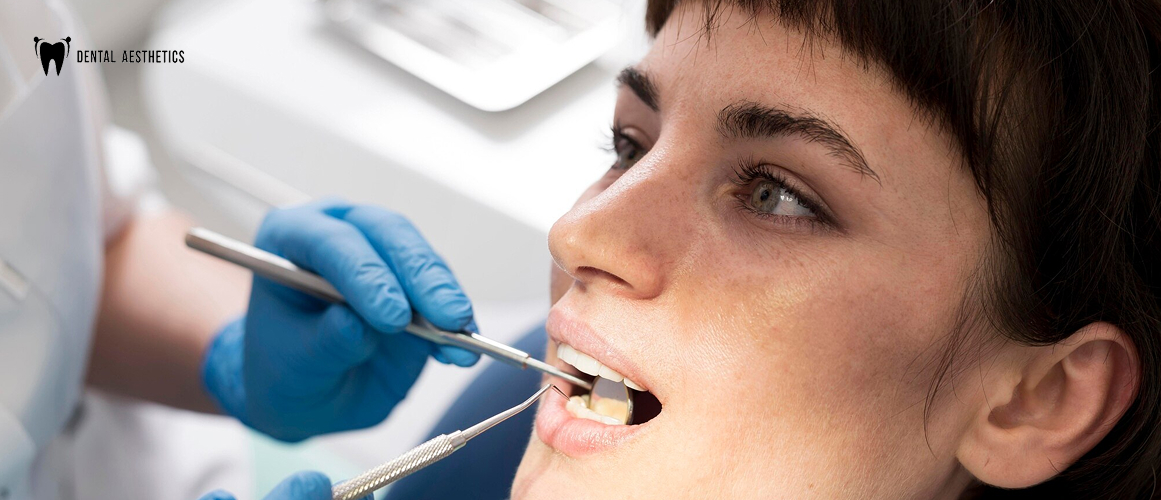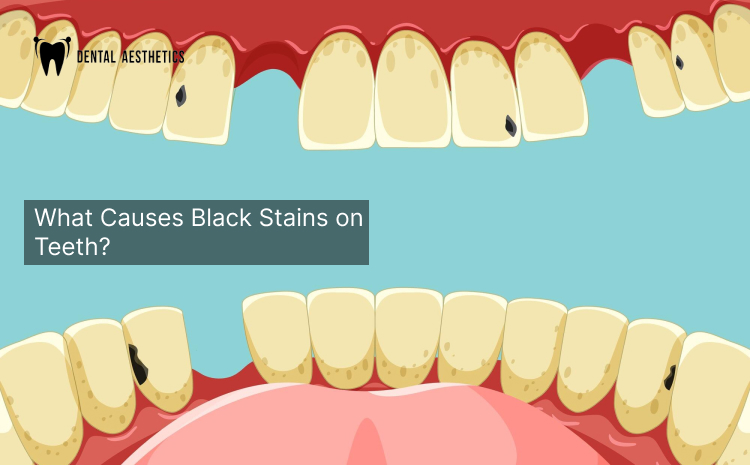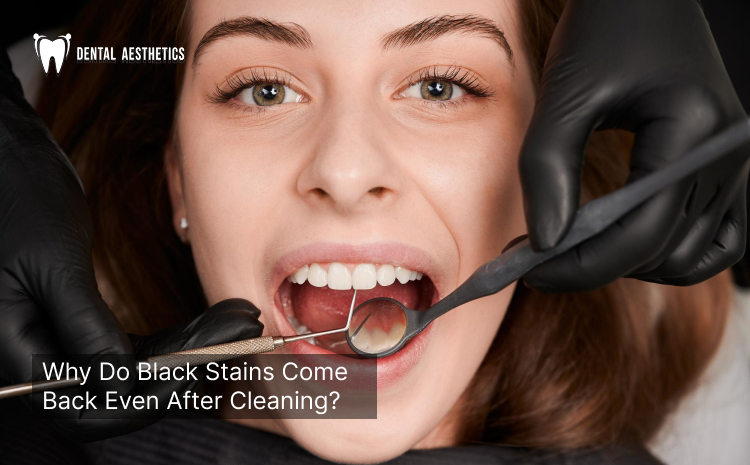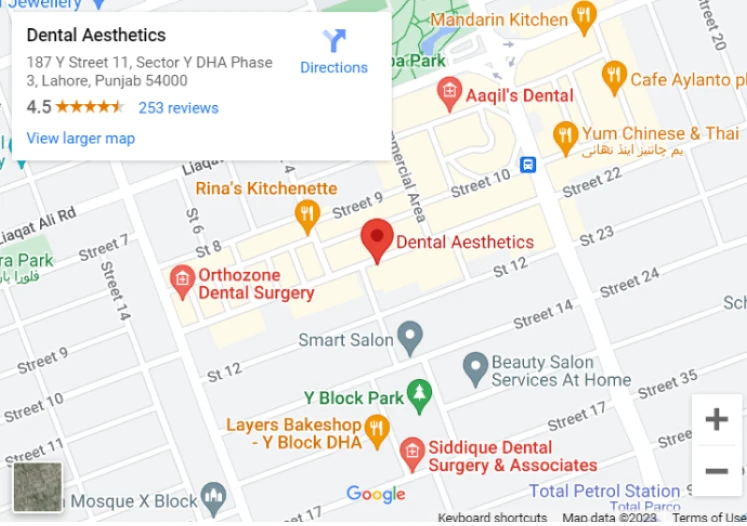How to Remove Black Stains from Teeth: Causes, Treatments, and Prevention

August 7, 2025
Black stains on teeth can be unsightly, frustrating, and sometimes hard to remove. Black stains can appear as specks, lines around the gums, or as areas on the teeth that are discolored black. Regardless of whether they were caused by lifestyle factors or some dental issues, these dark stains can detract from your smile and diminish your overall confidence in your oral health.
You should first begin to understand the causes; stains can be caused by excess consumption of tea, coffee, or tobacco; poor oral hygiene; certain medications; or certain types of bacteria in your mouth. For children or toddlers, black stains could be from iron supplementation, plaque buildup, or early exposure to pigmented foods.
With the right approach, it is possible to remove them and keep them from reappearing. This guide will give you everything you may be looking for, including causes, treatment options, prevention, and special considerations related to toddler teeth or black stains following a root canal. If you're looking for information on how to remove black stains from teeth or want to learn about cosmetic procedures, consulting a trusted clinic like Dental Aesthetics is the best first step to a bright and confident smile! They are renowned for providing a plethora of black stain removal procedures, such as teeth whitening.
What Is a Black Dental Stain?
A black dental stain has a characteristic thin black line that follows the gumline or is found in the fissures of molars. It is generally firm and not able to be brushed off with typical brushing.
These stains are often associated with chromogenic bacteria or mineralization found in dental plaque and tartar. While they can sometimes be harmless, they may, however, indicate that an oral hygiene regimen is lacking or a dental cleaning is overdue.
What Causes Black Stains on Teeth?

Black stains are caused by many different processes. For general discussion purposes, they can be categorized as extrinsic (surface) or intrinsic (within the tooth).
Extrinsic Cause
Extrinsic black stains have the longest list of causes. The general causes include- Chromogenic bacteria:These bacteria produce dark pigments that stain the surface of teeth. This black staining has been known to produce black line stains on teeth close to the gumline. Chromogenic bacteria were initially considered more often in children, but they can infect any individual.
- Poor dental hygiene: Poor brushing and flossing habits can lead to plaque and tartar building up on the teeth. Once tartar forms, new black stains may continuously develop over time. Additionally, plaque and tartar will harden and darken if the individual constantly consumes substances that are capable of staining or leaving dark residue on teeth.
- Staining foods and drinks: Food, snacks, and beverages we consume daily may stain the teeth because they can contain different tannins that stain. Daily exposures to beverages like coffee and tea may leave residual residue on the surface of teeth that could lead to staining that is cumulative over time.
- Staining foods and drinks: Food, snacks, and beverages we consume daily may stain the teeth because they can contain different tannins that stain. Daily exposures to beverages like coffee and tea may leave residual residue on the surface of teeth that could lead to staining that is cumulative over time.
- Tar and nicotine: Smoking or chewing tobacco is a leading perpetrator in producing stubborn dark stains on enamel.
- Iron supplements: Liquid iron supplements and some multivitamins may stain teeth black, especially if not rinsed right away.
- Certain mouthwashes: Mouth rinses with chlorhexidine to treat gum infections are notorious for dark stains when used frequently.
Intrinsic Causes
These stains originate from within the tooth's structure and are often more difficult to remove. Reasons include:- Root Canal: A tooth that has had a root canal treatment can darken to gray or black because of a change in the internal structure of the tooth.
- Dental Trauma: Certain medications, such as tetracycline antibiotics, can cause intrinsic staining, especially if taken during childhood when teeth are still developing.
- Root Canal: A tooth that has had a root canal treatment can darken to gray or black because of a change in the internal structure of the tooth.
- Medication: There are many medications causing variations of colors to the teeth; certain antibiotics can change the teeth to a gray/black hue if taken during the child's crucial tooth formation time.
Can Home Remedies Remove Stains?

While homemade remedies like baking soda, hydrogen peroxide, and activated charcoal toothpaste are common on the internet, the reality is that these measures are not effective for stains that go deeper than surface level, and sometimes, they can even work against you.
If you are seeing black spots or ongoing stains, don't take a chance; just consult an expert. In a dental aesthetics facility, you will receive safe, professional, and individualized treatment with real results without the risk of worsening any enamel or potentially causing harm to your health and teeth.
| Home Remedy | Disadvantages and Risks |
|---|---|
| Baking Soda & Hydrogen Peroxide | This can be a generic paste that is mildly abrasive to help move surface stains, but the hazard of repeated use is that these types of treatments will wear down your enamel and lead to sensitivity and permanent damage. |
| Oil Pulling | A traditional method that could stimulate some health in oral hygiene, which will not help with black stains or very persistent stains. |
| Activated Charcoal | Although it’s popular, it can be very abrasive. Long-term use can damage enamel and will leave your teeth looking dull over time. |
| Whitening Toothpaste | It will fade minor discolorations, but for intrinsic or deeper stains inside the tooth, whitening toothpaste won't have an impact to fix them. |
| Apple Cider Vinegar and Lemon Juice | Using these on your teeth can be harmful because of the high acidity that will weaken the enamel permanently. |
How to Remove Black Stains from Teeth
.jpg)
If home remedies are ineffective, or the stains are more than cosmetic, qualified dental care is your best option.
Dental Cleaning (Scaling and Polishing)
Ultrasonic cleaning and polishing paste by a dental hygienist can remove black stains. It works particularly well for:- Stains from chromogenic bacteria
- Tartar stains
- Iron stains and chlorhexidine stains
Teeth Whitening
Professional whitening treatments can correct deeper extrinsic stains and mild intrinsic stains. Options include:- In-office whitening treatment: Our trusted dentists at Dental Aesthetics will apply powerful bleaching agents in the office to give you immediate results.
- Take-home trays: Custom trays with peroxide gel are used for several weeks.
Microabrasion
Microabrasion involves using an abrasive and acidic combination to remove a thin layer of enamel. It is best for stains that remain after cleaning, often surface stains.Composite Bonding or Veneers
For stains that cannot be removed, like with innate discoloration or discolored roots after root canals, you may be recommended cosmetic solutions.- Composite Bonding involves using resin to cover the stain.
- Porcelain veneers help provide a stain-resistant, durable solution.
Black Stain on Teeth from Root Canal Treatments
It is common for a tooth to experience darkening after a root canal. The reasons for this are
- Dead pulp that was often left behind
- Restorative materials were used inside the tooth.
- The blood supply is not present inside the tooth anymore.
Black Stains on Teeth in Toddlers

If you notice your child has a black stain on their teeth, this can be alarming, but in cases like this, it’s often an aesthetic issue. Kids can sometimes have chromogenic bacteria that produce a black stain that is not associated with cavities.
Tips for Making Sure Decay is Not Present:
- Use a pea-sized amount of fluoride toothpaste and brush twice daily.
- Avoid bottle-feeding with milk or juices before bed.
- Plan a visit to the dentist for your child by age 1.
Black Lines on Teeth Near Gums
Dark lines along the gums happen because of:
| Cause | Solution |
|---|---|
| Tartar buildup in the gum area | Brush at the gumline |
| Chromogenic bacteria | Floss regularly |
| Older metal fillings or crowns that are leaking ions | Rinse with antibacterial mouthwash |
Is a Black Stain on a Tooth Dangerous?
Not always, however; it could be! Black stains can simply be harmless (e.g., chromogenic lines), but they could also lead to:
- Decay (black spots or holes)
- Periodontal disease (from tartar buildup)
- Dead tooth (from trauma or infection)
Black Stains from Coffee or Tea
Coffee, tea, and red wine possess tannins that cling to the enamel, thus causing stains.
Prevention Tips:
- Use a straw for any iced drinks.
- After consuming, rinse your mouth with water.
- Brush your teeth twice daily with a whitener.
- If you consume coffee every day, plan for touch-up cleanings.
How to Prevent Black Teeth Stains
The best approach to managing black stains is to deal with them beforehand.
| Oral Hygiene | Diet | Lifestyle | Dental Visits |
|---|---|---|---|
| Brush teeth with fluoride toothpaste at least twice a day | Limit coffee, tea, wine, and sodas | Quit smoking or otherwise using tobacco | Go for a professional cleaning every six months |
| Floss or use interdental brushes daily | Drink water as much as possible throughout the day | After taking iron supplements, rinse your mouth with clean water or drink through a straw | Be proactive with your treatments and consult your dentist before at-home remedies |
| Rinse mouth with an antibacterial mouthwash after brushing | Avoid sticky or sugary snacks | Don't use chlorhexidine for an extended period unless directed by a provider | If you have an excess of plaque buildup, consider fluoride varnishes and/or dental sealants |
Why Do Black Stains Come Back Even After Cleaning?

Generally speaking, black stains on teeth come back after dental cleanings for a couple of reasons: ongoing habits and (potentially) factors that originally caused the staining. The above habits are all potential reasons why your teeth get stained (smoking, drinking coffee/tea, taking iron pills, or not maintaining diligent oral hygiene). Black stains can also be due to the presence of chromogenic bacteria (commonly found in children), which create dark pigmented material that appears on teeth and backs very quickly from a previously cleaned/restored tooth. Additionally, stains return more quickly to rough or porous surfaces than to smooth surfaces (e.g., enamel that has not been brushed).
If this is your situation, your dentist may suggest:
- More frequent cleanings (once every 3–4 months)
- Use of a powered toothbrush
- Prescription-strength fluoride toothpaste or rinses
- Diet changes
Conclusion
Knowing how to remove black stains from your teeth starts with the reason they formed in the first place, regardless of whether that is bacteria, poor hygiene, certain foods, or an underlying issue. Home remedies can assist with their presence, but will most likely not fix your issue and are not as effective as proper tooth management through oral hygiene and dental cleanings.
Overall, great oral hygiene and visiting the dentist regularly will keep your smile white and stain-free longer. Whether your stains are from coffee, tartar, or a previous root canal, there are options available.
If you're concerned with untreatable black staining on teeth, please consult a dental professional located in Lahore, such as Dental Aesthetics, to determine what the best and safest order of treatment may be for your situation. Book your appointment now and get one step closer to that brighter smile you deserve!
Sources
Joiner A. Tooth colour: a review of the literature. Journal of Dentistry. 2004;32:3-12
https://www.healthline.com/health/dental-and-oral-health/black-tartar-on-teeth
https://www.medicalnewstoday.com/articles/321777



